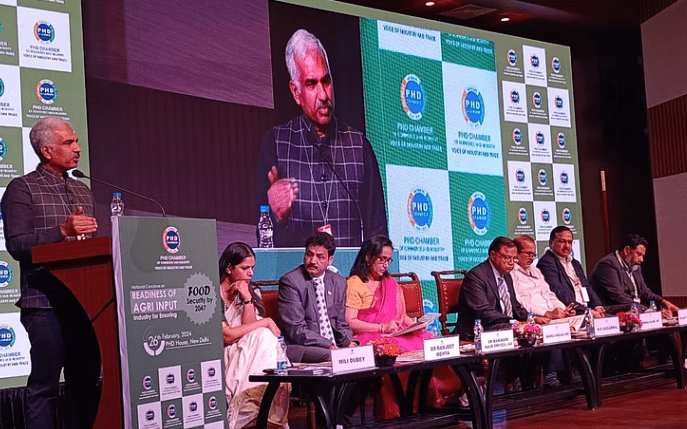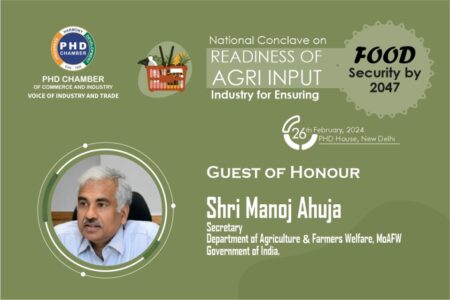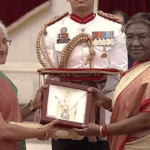Manoj Ahuja (IAS), Secretary, Department of Agriculture and Farmers Welfare, Government of India, underscored the importance of utilizing global linkages in land practices, adapting to local needs, empowering farmers with knowledge, and promoting decisive action while speaking at PHDCCI’s conclave on “Readiness of Agri Input Industry for Ensuring Food Security by 2047,” held on February 26, 2024, at PHD House, New Delhi. His insights shed light on the critical strategies needed to enhance agricultural productivity and sustainability in India.
Empowering Farmers with Knowledge
In his address, Manoj Ahuja highlighted the pressing need for the agriculture sector to adapt to evolving times and technology. He emphasized that empowering farmers with knowledge and ensuring their access to quality seeds, pesticides, and fertilizers are paramount for agricultural growth and food security.
Utilizing Global Linkages in Land Practices
Manoj Ahuja stressed the importance of meeting farmers’ requirements for knowledge and assurance regarding agricultural inputs. He emphasized the collective responsibility of both industry and the government in ensuring that farmers are equipped with the necessary information and tools to enhance their productivity and competitiveness.
Manoj Ahuja Promoting Decisive Action
The Secretary highlighted the significance of utilizing global connections in land practices while customizing solutions to local needs. Manoj Ahuja noted that adopting best practices from around the world can empower Indian farmers with superior knowledge and practices, thereby improving their global competitiveness.
Transparency and Technological Assistance
Manoj Ahuja emphasized the need for decisive action to decrease chemical pesticide usage and enhance agricultural resilience to climate change. He highlighted the importance of adopting sustainable agricultural practices to ensure the long-term viability of the agriculture sector.
Government Initiatives
Transparency and technological assistance were also highlighted as crucial elements in enhancing agricultural productivity and sustainability. Manoj Ahuja stressed the need for transparent practices in the agriculture sector and advocated for the use of technology to provide farmers with the necessary information and support.

Img Src:-Krishijagaran.com
Dr. Maninder Kaur Dwivedi’s Perspective
Regarding government initiatives, Ahuja outlined efforts such as the SATHI initiative, which aims to introduce traceability in seed inputs to enhance transparency without imposing cumbersome protocols. He urged industry stakeholders to empower farmers by disseminating product information through QR codes and similar means, promoting informed decision-making.
Minhaj Alam’s Insights
Dr. Maninder Kaur Dwivedi (IAS), Additional Secretary, Department of Agriculture and Farmers Welfare and Managing Director, Small Farmers AgriBusiness Consortium (SFAC) in the address shared the significant demand within the formal agricultural input sector, particularly in seed supply chains where private companies play a vital role. However, she noted challenges in seed distribution, stressing the importance of licensing and formal distribution channels to ensure accessibility, particularly in remote villages.
Dr. Ranjeet Mehta’s Remarks
Dr. Dwivedi emphasized the need for processing and manufacturing facilities to minimize seed losses. She called for a revaluation of existing farmer collectives’ networks to enhance the provision of agricultural inputs in rural areas. She also further highlighted the urgency for formal companies to aggressively target underserved areas to prevent the emergence of informal players. She cautioned against the risks associated with informal market penetration, citing examples where pesticide and insecticide distribution faced challenges in specific regions.
NK Aggarwal’s Emphasis
Minhaj Alam, IAS, Additional Secretary, MOFPI, Government of India while talking about food security, challenges, and opportunities, said our journey towards ensuring food security by 2047 demands selective action across the agriculture industry. We need to incentivize agriculture to ensure farmers continue farming and overcome the challenges they face. By addressing challenges, seizing opportunities, and fostering social cooperation, we can pave the way for a resilient and sustainable food system that meets the needs of each generation.
Vijay Sardana’s Discussion
Dr. Ranjeet Mehta, Executive Director, PHDCCI, discussed the critical importance of government and policymaker support for agriculture and farmers, particularly in ensuring food security for both India and the global community.
Dr. K. C. Ravi’s Perspective
Dr. Mehta also proposed a comprehensive approach to enhancing agricultural productivity, encompassing innovation in agricultural technologies, the development of resilient infrastructure to confront challenges, adaptation to climate change, leveraging digitization and data analytics, and fostering global collaboration through supportive policies. He encouraged stakeholders from the industry to contribute additional suggestions which PHDCCI will send to the government to further strengthen the agricultural sector’s support from the Indian government.
Vineet Nahata’s Views
NK Aggarwal, Chair, Agribusiness Committee, PHDCCI emphasized the necessity for collaboration among various segments of society, including farmers, industries, and policymakers, to achieve common agricultural goals. He underscored the significance of crop protection, farm mechanization, and farmer education, noting the critical need for improved awareness about micronutrient management to enhance crop quality and overall agricultural productivity. Addressing specific challenges such as black thrips and black fungus, he advocated for concerted efforts between the government and industry to tackle such issues. Aggarwal reaffirmed India’s commitment to prioritizing agriculture and the welfare of its farmers, projecting that by 2047, India would be capable of providing high-quality food and ensuring food safety on a global scale.
Support and Sponsorship
Vijay Sardana, Technolegal Expert, Advocate, Supreme Court of India and Chairman, Kisan Vigyan Foundation (KAKV) in his address highlighted two recent developments. Firstly, he discussed the latest European grain deal, which mandates a significant reduction of 50% in chemical pesticide usage, emphasizing its regulatory impact. Secondly, he addressed the Artificial Intelligence Act of the European Union. He also emphasized the importance of enhancing resilience to these emerging challenges, signaling the need for proactive measures to adapt and respond effectively.
The conclave was supported by the Ministry of Agriculture and Farmers Welfare, the Agricultural Processed Food Products Export Development Authority (APEDA), Ministry of Food Processing Industries. Small Farmers Agribusiness Consortium.
Click Here For More Latest News Articles
FAQs
- What is the significance of adapting to evolving times and technology in agriculture?
- Adapting to evolving times and technology in agriculture is crucial for enhancing productivity, efficiency, and sustainability. Manoj Ahuja said it allows farmers to improve their practices, reduce costs, and produce higher-quality crops. Additionally, adopting modern technology can help farmers mitigate the impacts of climate change and improve their resilience to environmental challenges.
- How can global linkages in land practices benefit local farmers?
- Global linkages in land practices can benefit local farmers by providing them with access to innovative farming techniques, advanced machinery, and high-quality inputs. By learning from global practices and customizing them to local needs, farmers can improve their productivity and competitiveness in the global market. Additionally, global linkages can help farmers access international markets, expanding their opportunities for growth and success.
- What are some key government initiatives discussed at the conclave?
- Some key government initiatives discussed at the conclave include the SATHI initiative, which aims to introduce traceability in seed inputs to enhance transparency. The government also emphasized the importance of empowering farmers with knowledge and ensuring their access to quality seeds, pesticides, and fertilizers.
- How do cooperatives contribute to the agricultural sector?
- Cooperatives play a crucial role in the agricultural sector by providing farmers with collective bargaining power, access to resources, and opportunities for collaboration. Cooperatives can help farmers improve their market access, reduce input costs, and enhance their overall productivity and profitability. Additionally, cooperatives promote social cohesion and empower farmers to take control of their livelihoods.
- What are some challenges facing the crop protection industry?
- Some challenges facing the crop protection industry include the need for sustainable pest management practices, the emergence of pesticide-resistant pests, and the environmental impact of chemical pesticides. Additionally, ensuring the safety and efficacy of crop protection products, as well as promoting responsible pesticide use among farmers, are ongoing challenges for the industry.










